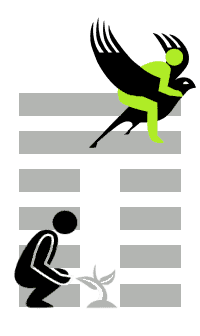Here. Now. At this moment it is wise to withdraw into our own root. To withdraw from the world. To turn our gaze inwards. Just as a plant does in winter. To do nothing. This moment belongs to us alone. We draw strength. Like a wave, which stretches back into the sea, concentrating its energy. And even though it may look as if we surrender – we do not surrender. We gather our strength. We focus our energy. In non-action (Wu Wei) we are provides with everything we may need at this moment. Incidentally letting go of a few old, unnecessary things / thoughts / attitudes… before we powerfully rush back into life.
Scope of Questions
- A user askes with reference to a previous* question: “What good about my current situation and what happens next?” The I Ching answers with hexagram 20 – contemplation.
- One user asks: “How will my blog develop?”
- One user asks: “Should I pool my strengths and experience and pursue a real career after all? Or should I utilize them and leave room for different exciting directions?”
- Another user asks: “How do I deal with the pain of the break-up of my partnership?”
* Her earlier question “What situation am I in?” resulted in hexagram 12 – stagnation. It is amazing that both hexagrams, 12 – stagnation and 20 – contemplation, exhibit a lot of similarity: just one single line, the 4th one, varies. In stagnation (hexagram 12) it is a yang line (solid line), in contemplation (hexagram 20), it is a yin line (broken line). For the analysis of hexagram 20 – contemplation that means that Kun (the earth) is now both lower trigram and first core character and that the hexagram ends in Sun, the wind / tree upper trigram.
Case Study
Kun at the beginning of hexagram 20 – contemplation refers to the place or situation we are currently in. Kun invites us to take inventory: that what is here and now counts, our achievements, our safe stand, our feeling of being held. Unfortunately we only occasionally become aware of these – often quite tangible – facts, but if so, we can unlock them as a our source of strength for the road ahead.
While talking to the user an image to illustrate Kun – or double Kun of hexagram 20 – comes to my mind: the image of a a wave rolling back into the sea, concentrating in the ocean’s depths, drawing new energies.
At the beach we usually only notice waves as they are licking the sand, pressing forward, powerfully conquering new territories. Until they then suddenly and unexpectedly collapse and retire. We humans, earthly dwellers, like to see the wave’s turning point, the beginning of the wave’s retreat, as a kind of surrender, just as we tend to (mis-)consider any withdrawal as capitulation.
But is a retreat into one’s own roots, into one’s own origins, really surrender? To stay with the image of the wave: even a tsunami recedes to the sea and releases the land – only to then again push forward with elemental force. Whoever takes the tsunami’s retreat for surrender is fatally mistaken.
The double Kun, the earth (lower trigram and first core character) is an invitation to calm down and retreat to our own origins as a source of strength. This does not at all mean weakness but rather indicates introspection with the environment being excluded. It’s a private, a priviledged moment, an intimate conversation with ourselves, with no single detail ever penetrating outwards, until the moment when we – eventually – determinedly, very clearly and powerfully, will re-enter the world.
The double Kun turns into Gen, the mountain (second core character). In our conversation, we discussed what kind of disengagement or boundaries Gen might refer to. We agreed upon culturally bequeathed criteria for evaluating success. In the specific case of the user: due to her professional experience she is questioning these traditional criteria since quite some time. But she still applies them in her self-assessments. Her personal conclusion is consequently to apply only those evaluating standards in the future that she has recognized as appropriate during their (life)path.
Hexagram 20 – contemplation results in the upper trigram Sun (the wind / tree), seemingly gentle but actually relentless growth from the inside out. Here again the image of the wave – perhaps even the tsunami – comes to my mind: something is happening deep within the sea, the wave’s direction has changed unnoticed and now it is approaching land. The extent of its growth, how much knowledge and experience will be implemented, will strongly depend on how much energy it has collected during its retreat to the ocean’s ground.
Debra Kaatz writes on MA43 Gu Xian:
Valleys open themselves to what comes… By doing nothing but by being receptive, the valley is given what it needs. Xian Gu is falling into this valleys. It is what happens when the fruits ripen… The valley also receives the movement of the heavens and all its inspiration and grows in ways it could not imagine… Here the vision and burst of energy that comes with the spring can open our eyes and help us see the world afresh. Kaatz 2005
The current interpretation can be found here: https://www.no2do.com/hexagramme_en/888877.htm
Bibliography
— Kaatz, Debra. 2005. Characters of Wisdom: Taoist Tales of the Acupuncture Points. The Petite Bergerie Press.



